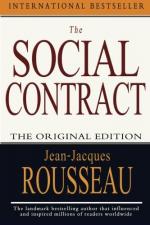
|
| Name: _________________________ | Period: ___________________ |
This test consists of 5 multiple choice questions, 5 short answer questions, and 10 short essay questions.
Multiple Choice Questions
1. According to the author, which of the following is the sign of a good government?
(a) Never present.
(b) Absolute.
(c) Hidden.
(d) Different for different countries.
2. Which of the following governments does the author cite as an example for assembling all citizens in the state?
(a) Ancient Russia.
(b) Ancient Germania.
(c) Ancient Greece.
(d) Ancient Rome.
3. The author believes that representatives are an unnecessary level of mediation between the Sovereign Will and which of the following?
(a) The people.
(b) The Prince.
(c) The government.
(d) The Legislator.
4. The law committing the state to the social contract requires what type of vote?
(a) Two-thirds vote.
(b) Majority vote.
(c) Unanimous vote.
(d) Super-majority vote.
5. According to the author, what happens to the power of the Prince, magistrate, and legislator when assemblies form?
(a) It is reaffirmed.
(b) It increases.
(c) It is given to them.
(d) It ceases.
Short Answer Questions
1. When good sense, justice, and integrity are sufficient for a position, who should be in the lot to be chosen for those positions?
2. Which of the following terms is used to describe belief in one god to the exclusion of all others?
3. According to the author, the Princes who act as executives are fulfilling their duty as which of the following?
4. The citizens of Rome were freed from their day-to-day chores by slaves which allowed them to do which of the following?
5. Those votes influenced by the will of a despot are not which of the following?
Short Essay Questions
1. How did the ancient people think of nature?
2. Pursuant to the author's rule, what is the exception to the government never being altered?
3. What would happen if the Sovereign Will enacted laws?
4. What does a censor do?
5. What are the three forms of aristocracy?
6. How does the author define a democracy?
7. What does monotheism mean?
8. What type of situation calls for a dictator?
9. For what purpose does the author use the government in Venice as an example?
10. What is the only law that the author believes requires unanimous consent?
|
This section contains 558 words (approx. 2 pages at 300 words per page) |

|




